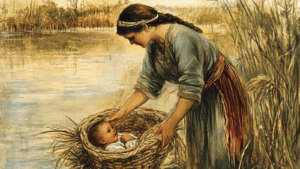You may use the following reflection for personal Bible study, or with a group, perhaps before a food ministry or during a community meal.
Have you noticed how much food there is in the Bible?
- The creationCreation, in biblical terms, is the universe as we know or perceive it. Genesis says that in the beginning God created the heavens and the earth. In the book of Revelation (which speaks of end times) the author declares that God created all things and... More story sets up a world that produces a plethora of plants and animals in the Garden of Eden (Genesis 1 and 2)
- The first temptation is hidden in a piece of fruit (Genesis 3:1-7)
- Joseph saves the land from famine (Genesis 41)
- When the Israelites are wandering in the wilderness, God provides manna and quail, enough to survive in the desert (Exodus 16:1-36)
- In the laws laid out in Deuteronomy, the people of God are called to set apart a tithe: a portion of crops and livestock for those in the community who could not work the land to produce their own food (Deuteronomy 14)
And those are just a few examples in the first five books of the Bible!
Kitchen parables
A while back, I worked in the kitchen at Holden Village (a Lutheran retreat center in the Cascade mountains of Washington State). During one Sunday brunch I was in a particular rush to get everything ready on time. Finally, once nearly everyone else had eaten, I sat down to eat my own plate of egg bake, roasted potatoes and fruit. As soon as I put a bite of that egg bake in my mouth, I knew that I had put way too much salt in it. A wave of embarrassment came over me as I looked out over the dining hall, sure that everyone was talking about how terrible brunch was and that I clearly couldn’t follow a recipe.I muttered my shame to one of my fellow cooks sitting next to me. He smiled, and pushed his eggs around on his plate. “Don’t worry, they aren’t that bad. Besides, there’s always next time.”
The Bible often talks about food, but never from the perspective of the cook—or at least an earthly cook. Where are the parables of “The Cook Who Accidentally Put Soap Instead of Oil in the Bread,” or “The Chef Who Ran Out of Rice and Beans in the Middle of Rice and Beans for 300?” (Both are true stories, by the way.) Even though kitchen parables didn’t make it into the biblical canonA canon is a general law or principle by which something is judged. The body of literature in the Old and New Testaments is accepted by most Christians as being canonical (that is, authentic and authoritative) for them. More, I think they still have some wisdomWisdom encompasses the qualities of experience, knowledge, and good judgment. The Old Testament book of Proverbs, which sometimes invokes a Woman as the personification of Wisdom, is a collection of aphorisms and moral teachings. Along with other biblical passages, it teaches, "The fear of the... More to impart. Of the many kitchen fumbles turned parables I’ve experienced, the wisdom I keep receiving revolves around the same theme: whatever went wrong isn’t the end of the story, and there will always be another breakfast, lunch, dinner—or brunch. Sometimes graceGrace is the unmerited gift of God's love and acceptance. In Martin Luther's favorite expression from the Apostle Paul, we are saved by grace through faith, which means that God showers grace upon us even though we do not deserve it. More is experienced as the courage to try again.
The abundance of meal-themed stories continues into the New Testament.
- Jesus’ first miracle changing water into wine at a wedding feast (John 2:1-11)
- The feeding of 5,000 (MatthewA tax collector who became one of Jesus' 12 disciples. More 14, Mark 6, LukeThe "beloved physician" and companion of Paul. More 9, John 6), and the feeding of 4,000 (Mark 8 and Matthew 15)
- The parableA parable is a brief story with a setting, an action, and a result. A prominent aspect of Jesus' teaching was telling parables to illustrate something about the kingdom, or reign, of God. More of the wedding banquet (Matthew 22:1-11), where the first invitees never came, but a motley crew from the streets did
- In the book of Luke, JesusJesus is the Messiah whose life, death, and resurrection are God's saving act for humanity. More seems always to be eating, and
- In the last chapter of John (21), Jesus shares breakfast with his disciples and then calls them to “Feed my sheep.”
Put those stories together
I now work for Shobi’s Table, a pay-as-you-can food truck in St. PaulThe Apostle Paul, originally known as Saul of Tarsus, was the author of several New Testament letters and the founder of many Christian communities. More, Minnesota. Going from a brick and mortar kitchen to one on wheels was quite a learning experience. One of my first days of serving lunch, rice pilaf was on the menu. We had a full load that day, and had to find creative ways to store the food for the 10 minute drive. Once it all seemed secure, we piled in the cab and headed out. Halfway there, we turned around a corner, and BAM! A loud, metallic crash echoed in the back. Arriving at our destination, we opened the back door and saw that nearly all of the rice had fallen to the floor. We jumped into a frenzy to fix it, but only ended up with a few cups more rice. Somehow, like the woman who fed ElijahA miracle working Israelite prophet who opposed worship of Baal. More from nearly empty jars (1 Kings 17), we had enough for everyone. That story from our life together mixed with the one from the Bible tastes good, right?
Perhaps the most important meal of all was the last supper (Matthew 26, Mark 14, Luke 22, 1 Corinthians 11). Jesus says “This is my body, which is given for you. Do this in remembrance of me … This cup that is poured out for you is the new covenantBecause Israel had broken the old covenant, the prophet Jeremiah declared that God would establish a new covenant, one that would be written on the heart. The New Testament is often referred to as the New Covenant because Jesus came to fulfill the law and... More in my blood” (Luke 22:19-20). Of all the things on this planet that Jesus could have chosen for us to remember him by, he chooses bread and wine: a meal, enough for everyone.
It’s true that the human body can last a little while without food, but to truly live and thrive, we need to eat and drink. We don’t need to eat just once, but again and again. Breakfast, lunch, dinner. Repeat, repeat, repeat. This is how Jesus chose to embody his sacrificial love for us.
Every church tradition celebrates Communion differently. Some do it every week, some once a quarter, and others maybe only once a year. This liturgical practice in worship is essential to our identity as Christians no matter how often it happens. But I don’t think that Jesus intended it to be the only time we remember him this way. We find the bread and wine not only on an altar where the sacrificeSacrifice is commonly understood as the practice of offering or giving up something as a sign of worship, commitment, or obedience. In the Old Testament grain, wine, or animals are used as sacrifice. In some New Testament writings Jesus' death on the cross as the... More is offered, but at a table where people eat together. This has always been reason enough for me to stretch the meaning of the eucharistic meal on Sundays to the regular meals on every other day, set on kitchen counters and tables, picnic benches, breakrooms, dining halls, and served from food trucks.
Those of us who have the privilege of calling the kitchen our vocational home (home cooks included!) have the opportunity to practice the theology of the Table every day. Cooking translates God’s love to ourselves and whoever we feed in a tangible way. God provides the raw inspiration of sun, soil and seed. Farmers nurture crops and livestock to maturity. And the cook culminates the process by baking, sauteing, roasting, chopping and mixing this vast nourishing palette into love made edible. Turns out cooking is the new evangelism!
God’s love is aching to be wherever anyone is hungry in body and soul, and invites us to join in spreading that love wherever we go. It is not a one-and-done kind of love, but a love that feeds us again and again, day after day. It is a love that is not tripped up by mistakes, but one that learns and grows. It is a love that is not defined by our problems, but is liberated by the freedom to try again. It tastes good, satisfies our souls, and strengthens and energizes us to live whole lives. God’s love isn’t a fluffy idea, it is necessary for our survival.
Reflect:
- Body: Eat and cook mindfully. Take all distractions away before you begin. Pray before and/or after. Let your motions be your prayer.
- Mind: Read John 21. “Regular meals” means different things to different people. Some take it for granted that their access to food is plentiful. Some regularly run out of money at the end of the month to pay for food. With this in mind, what would it be like for you if Jesus asked you to breakfast tomorrow, and then asked you to feed his sheep?
- Heart: Think back on some of your favorite and least favorite memories around food. Is there a smell that brings you back to a certain time? A taste that reminds you of someone? What feelings come back to you and why?







